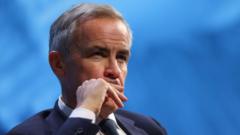With Prime Minister Justin Trudeau announcing his intent to resign, former Bank of Canada and Bank of England governor Mark Carney is contemplating a campaign to succeed him. Known for his economic expertise and dedication to climate action, Carney emerges as a key contender, amid growing support for Conservative opposition.
Mark Carney Weighs Bid for Leadership of Canada’s Liberal Party Following Trudeau's Announcement

Mark Carney Weighs Bid for Leadership of Canada’s Liberal Party Following Trudeau's Announcement
Former central banker Mark Carney considers challenging for the leadership of Canada's Liberal Party as Prime Minister Justin Trudeau steps down after mounting pressures.
As Prime Minister Justin Trudeau prepares to step down after a tumultuous nine years, former central banker Mark Carney is pondering whether to enter the race to lead Canada's Liberal Party. Trudeau's resignation follows intensifying pressure from within his party and declining poll numbers, clearing the way for new leadership.
Carney, 59, acknowledged his consideration of the candidacy in an interview with the Financial Times, emphasizing a thoughtful decision-making process alongside his family. Although he has no prior experience in public office, his extensive background in central banking positions him as a well-respected economic figure. Having served as Governor of the Bank of Canada from 2007 to 2013 and subsequently at the Bank of England until 2020, Carney played a pivotal role in managing responses to significant global crises, including the financial collapse, Brexit, and the COVID-19 pandemic.
In the current political climate, Carney’s potential bid for leadership could resonate with Canadians facing critical issues, particularly as the country is due for a federal election by October. However, speculation suggests that the election could occur sooner given the mounting support for the Conservative Party, led by Pierre Poilievre, which is currently enjoying a substantial lead in opinion polls.
Throughout his career, Carney has advocated for progressive Liberal policies, including the contentious federal carbon tax which has faced backlash among conservative circles. He has publicly criticized Poilievre’s platform, describing it as void of a coherent plan. Additionally, Carney’s experience as the United Nations' special envoy on climate action underscores his commitment to environmental sustainability, labeling the quest for net-zero emissions as "the greatest commercial opportunity of our time."
While Carney is a prominent candidate, he is not the only name being floated as a potential successor. Other figures, including Trudeau’s former deputy Prime Minister Chrystia Freeland, and Transport Minister Anita Anand, are also viewed as viable candidates. Trudeau has committed to overseeing a competitive selection process for his replacement, with the goal of appointing a new leader before the prorogation period concludes on March 24.
As Canada prepares to navigate this leadership transition, the political landscape remains uncertain, with pressing environmental challenges and pressing issues at the forefront of voters' concerns.


















